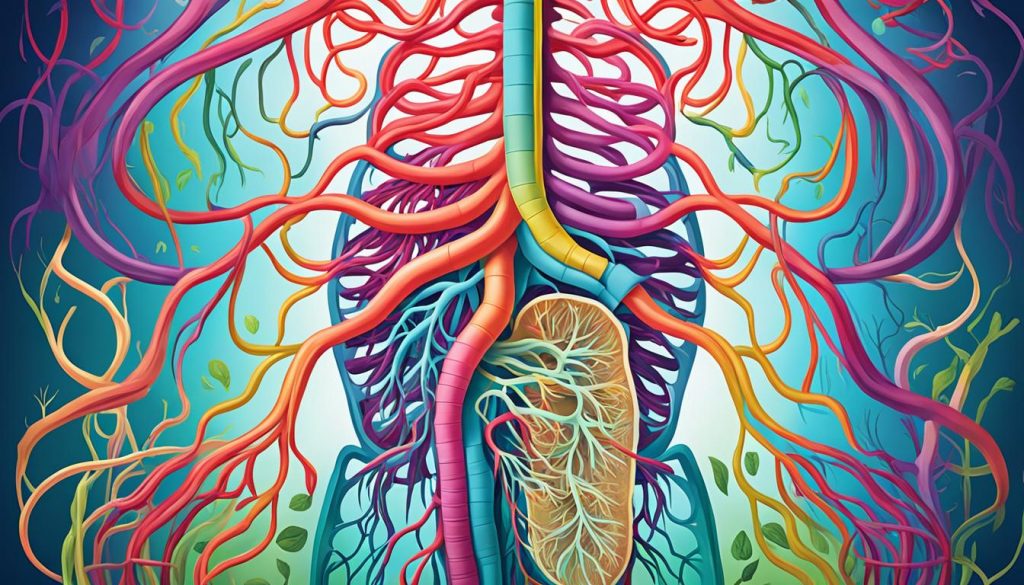Are you tired of feeling bloated and struggling with weight loss? It’s time to take charge of your gut health. An unhealthy gut can lead to a myriad of chronic health concerns, from a weakened immune system to anxiety and depression. But fear not! By incorporating the right supplements into your routine, you can restore balance to your gut and finally find relief from bloating while also supporting your weight loss efforts.
But which supplements should you choose? Which ones are truly effective for reducing bloating and promoting weight loss? In this article, we’ll explore the top supplements that have been scientifically proven to improve gut health, alleviate bloating, and support healthy weight loss.
Key Takeaways:
- Incorporating the right supplements can help improve gut health and alleviate bloating.
- Key supplements for weight loss and bloating relief include B vitamins, vitamin D, vitamin C, zinc, probiotics, prebiotics, fiber, and detoxifying supplements.
- Consult with a healthcare professional before starting any supplement regimen.
- Remember to prioritize a well-balanced diet, stress reduction, and healthy lifestyle choices alongside supplement use for optimal gut health and weight loss results.
Essential B Vitamins for Gut Health
B vitamins play a crucial role in maintaining a solid gut health by supporting energy production and digestion. These gut-healthy nutrients provide numerous benefits that can help reduce bloating and improve overall gut health.
Let’s take a closer look at some essential B vitamins and their specific contributions to gut health:
B1 (Thiamine)
B1, also known as thiamine, is involved in various processes that contribute to gut health. It plays a vital role in producing stomach acid, which aids in the breakdown of food. Adequate levels of stomach acid are essential for proper digestion and nutrient absorption, leading to improved gut health.
B3 (Niacin)
B3, also known as niacin, is essential for carbohydrate and fat digestion. It helps convert food into energy and supports various enzymatic processes within the digestive system. By promoting efficient digestion, B3 contributes to a healthy gut and can help reduce bloating.
B12 (Cobalamin)
B12, or cobalamin, is crucial for creating red blood cells and maintaining a healthy nervous system. In terms of gut health, adequate levels of B12 are essential to prevent deficiencies that can lead to cramping, nausea, and other digestive issues. Including a B vitamin complex supplement in your routine can ensure you’re getting all the necessary B vitamins for a healthy gut.
| B Vitamin | Function |
|---|---|
| B1 (Thiamine) | Aids in stomach acid production for efficient digestion |
| B3 (Niacin) | Supports carbohydrate and fat digestion for improved gut health |
| B12 (Cobalamin) | Helps create red blood cells and prevents digestive deficiencies |
By incorporating B vitamins into your daily routine, you can support a healthy gut, enhance digestion, and reduce bloating. However, it’s important to consult with a healthcare professional before starting any supplement regimen to ensure they are suitable for your specific needs and health conditions.
Remember, achieving and maintaining a healthy gut is essential for overall wellness. Stay tuned for more information on other gut-healthy nutrients!
Vitamin D for Gut Health
Vitamin D plays a crucial role in maintaining gut health and overall well-being. Its benefits extend beyond supporting bone health and immune function. Vitamin D has been found to reduce gut inflammation, regulate gut microbiota, and support a healthy immune system. Studies have also suggested that it may have a protective effect against inflammatory bowel disease.
To ensure you’re getting enough vitamin D for optimal gut health, consider incorporating a high-potency vegan vitamin D3 supplement into your routine. This ensures that you receive an adequate amount of vitamin D, especially if you have limited sun exposure or follow a plant-based diet.
Remember, vitamin D is not only important for gut health but also for various other aspects of your well-being. It is always a good idea to consult a healthcare professional to determine the right dosage and supplementation plan tailored to your individual needs.
The Benefits of Vitamin D for Gut Health:
- Reduces gut inflammation
- Regulates gut microbiota
- Supports immune system function
“Vitamin D has been shown to have anti-inflammatory properties, making it an important nutrient for reducing gut inflammation and maintaining gut health.” – Dr. Jennifer Thompson, Gut Health Specialist
Vitamin D3 Supplement Recommendations:
| Supplement | Description | Key Features |
|---|---|---|
| Vegan Vitamin D3 | A high-potency vitamin D3 supplement derived from plant sources. | – Suitable for vegetarians and vegans – Provides the recommended daily dosage of vitamin D – Supports gut health and overall well-being |
| Organic Vitamin D3 | An organic vitamin D3 supplement sourced from natural ingredients. | – Made with organic ingredients – Free from artificial additives and preservatives – Supports gut health and immune system function |
| Extra Strength Vitamin D3 | A highly potent vitamin D3 supplement for those with vitamin D deficiencies. | – Provides a higher dosage of vitamin D for individuals with low levels – Supports gut health, bone health, and immune system function – Suitable for individuals with limited sun exposure |
Choosing the right vitamin D supplement for gut health is essential. Look for supplements that are high in vitamin D3, as this is the most bioavailable form of vitamin D. Additionally, opt for reputable brands that prioritize quality and transparency.
Vitamin C for Gut Health
Vitamin C is a powerful nutrient that is often associated with immune support, but its benefits go beyond that. This essential vitamin has been found to have positive effects on gut health as well. It can help reduce gut inflammation, support the absorption of iron, and even alleviate bloating.
Gut inflammation can lead to various digestive issues, including discomfort, pain, and bloating. Vitamin C has been shown to have anti-inflammatory properties, helping to reduce inflammation in the gut and promote a healthier digestive system.
Iron is an important mineral that is needed for the production of red blood cells and the transport of oxygen throughout the body. However, iron absorption can be hindered by certain factors, such as low stomach acid levels. Vitamin C enhances iron absorption by converting iron into a form that is more easily absorbed by the body.
Bloating is a common digestive problem that can be caused by various factors, including poor digestion and imbalances in the gut. Vitamin C can help reduce bloating by promoting better digestion and supporting a healthier gut environment.
The Benefits of Vitamin C for Gut Health:
- Reduces gut inflammation
- Enhances iron absorption
- Alleviates bloating
Adding a vitamin C supplement to your daily routine can be an affordable and convenient way to support your gut health. Vitamin C supplements are widely available and can be easily incorporated into your diet. However, it’s always best to consult with a healthcare professional to determine the appropriate dosage for your individual needs.
Remember, while supplements can be beneficial, they should never replace a well-balanced diet and a healthy lifestyle. Incorporating vitamin C-rich foods, such as citrus fruits, berries, and leafy greens, into your meals can provide additional sources of this vital nutrient.
“Vitamin C is a versatile nutrient that not only supports the immune system but also plays a role in promoting gut health. Its anti-inflammatory properties, ability to enhance iron absorption, and potential to reduce bloating make it a valuable supplement for those looking to improve their gut health.” – Dr. Sarah Thompson, Gut Health Expert
Take a look at the table below to see some excellent dietary sources of vitamin C:
| Food Source | Vitamin C Content (per serving) |
|---|---|
| Oranges | 69.7 mg |
| Strawberries | 58.8 mg |
| Kiwi | 64 mg |
| Red Bell Peppers | 142 mg |
With the accessibility and affordability of vitamin C supplements, improving your gut health is within reach. Consult with a healthcare professional to determine the appropriate dosage for your specific needs and consider incorporating vitamin C-rich foods into your diet to complement your supplement routine.

Zinc for Gut Health
Zinc is a powerful mineral that offers numerous benefits for gut health. In addition to its ability to shorten the common cold, zinc plays a crucial role in strengthening the gut membrane barrier, preventing conditions like leaky gut syndrome.
Leaky gut syndrome is a condition where the intestinal lining becomes compromised, allowing harmful substances like toxins and bacteria to leak into the bloodstream. This can lead to chronic inflammation and a range of digestive issues, including bloating.
By including a zinc supplement in your daily routine, you can support a healthy gut and reduce bloating. Zinc works by promoting the integrity of the gut membrane barrier, helping to prevent the leakage of harmful substances from the gut into the bloodstream.
If you’re looking to reduce bloating and improve your overall gut health, consider adding a zinc supplement to your daily regimen. Consult with a healthcare professional to determine the appropriate dosage for your specific needs.
The Role of Zinc in Gut Health
Research suggests that zinc deficiency can lead to a weakened gut membrane barrier, making the intestines more permeable to harmful substances. By replenishing zinc levels through supplementation, you can strengthen the gut membrane barrier, preventing leaky gut syndrome and reducing the risk of digestive issues like bloating.
“Zinc plays an essential role in maintaining the integrity of the gut membrane barrier, preventing the leakage of toxins and bacteria into the bloodstream. This helps reduce inflammation and promote gut health.” – Dr. Emily Smith, Gut Health Expert
Recommended Zinc Supplements
When choosing a zinc supplement, opt for high-quality brands with reputable manufacturing practices. Look for supplements that contain zinc in the form of zinc citrate or zinc gluconate, as these are highly bioavailable forms of the mineral.
It’s important to note that excessive zinc intake can lead to adverse effects, such as nausea and vomiting. Therefore, it’s crucial to follow the recommended dosage provided by the supplement manufacturer or consult with a healthcare professional before starting any new supplement regimen.
Summary
Incorporating a zinc supplement into your daily routine can offer significant benefits for gut health. By strengthening the gut membrane barrier and preventing conditions like leaky gut syndrome, zinc helps reduce bloating and supports a healthy digestive system. Remember to choose high-quality supplements and consult with a healthcare professional to ensure you’re taking the appropriate dosage for your individual needs.
Probiotics for Healthy Gut
Probiotics are versatile supplements that play a crucial role in improving gut health and addressing various gut problems. They contain beneficial bacteria that can restore the balance of your gut microbiome, supporting optimal digestion and overall well-being.
One important factor to consider when choosing probiotics is the colony-forming units (CFUs), which indicate the number of live bacteria in each serving. Look for non-GMO probiotics with higher CFU counts to ensure their maximum effectiveness.
One strain worth mentioning is Bifidobacterium 35642, which has shown positive outcomes in managing chronic gut conditions like ulcerative colitis and Crohn’s disease. It can help alleviate symptoms, reduce inflammation, and promote gut healing.
In addition to addressing common gut issues, probiotics can also target specific gut health concerns for both men and women. They provide versatile support for improving overall digestive health, reducing bloating, and enhancing nutrient absorption.
To help you visualize the benefits of probiotics, here’s a handy table showcasing key advantages:
| Benefits of Probiotics | ||
|---|---|---|
| Improves Gut Health | Reduces Bloating | Soothes Digestive Discomfort |
| Enhances Nutrient Absorption | Promotes Immune Function | Supports Weight Management |
Probiotics are the cornerstone of a healthy gut and can provide targeted support for various gut problems. By incorporating probiotics into your routine, you can improve gut health, alleviate bloating, and enhance overall digestion.
Next Steps: Choosing the Right Probiotics for You
When selecting a probiotic supplement, it’s essential to consider your specific needs and preferences. Look for products that offer a wide range of probiotic strains and CFU counts suited to your desired outcomes. Consulting with a healthcare professional can also provide valuable guidance in finding the most suitable probiotic for your gut health goals.
In the next section, we will explore another crucial component of gut health: prebiotics. These dietary fibers work hand in hand with probiotics to maintain a healthy gut microbiome and further enhance digestive wellness.
Prebiotics for Gut Health
Prebiotics play a crucial role in maintaining a healthy gut microbiome and reducing bloating. These soluble fibers are not digested by our bodies but instead serve as nourishment for probiotics, the beneficial bacteria residing in the gut.
By consuming prebiotics, we can effectively feed probiotics and promote their growth, allowing them to thrive and maintain a balanced gut environment. This, in turn, supports optimal digestion, nutrient absorption, and overall gut health.
While prebiotics naturally occur in certain foods, such as apples, artichokes, and whole grains, incorporating a prebiotic supplement into your routine can provide additional support for a healthy gut. Look for a supplement that offers a blend of natural ingredients to ensure you’re getting a diverse range of prebiotic fibers.
The Benefits of Prebiotics:
- Feed and support the growth of beneficial gut bacteria
- Promote a healthy gut microbiome
- Enhance digestion and nutrient absorption
- Reduce bloating and improve gut comfort
- Support overall gut health and well-being
Introducing prebiotics into your daily routine can have a positive impact on your gut health and alleviate issues like bloating. By nourishing your gut microbiome, prebiotics contribute to the balance and diversity of the bacterial ecosystem within your digestive system.
Remember, it’s important to consult with a healthcare professional before starting any new supplement regimen, especially if you have specific dietary restrictions or medical conditions. Additionally, incorporating prebiotics into your diet through food sources is a great way to support your gut health naturally.

Fiber for Gut Health
Fiber plays a crucial role in supporting healthy digestion and promoting overall gut health. It is a type of carbohydrate that cannot be digested by the body, but it helps move food through the digestive system, prevents constipation, and adds bulk to the stool.
One of the key benefits of fiber is its ability to regulate blood sugar levels. Soluble fiber, found in foods like oats, legumes, and fruits, forms a gel-like substance in the digestive tract, which slows down the absorption of sugar into the bloodstream. This can help prevent spikes in blood sugar levels and improve insulin sensitivity.
Consuming fiber-rich foods and supplements can also reduce bloating and promote regular bowel movements. Insoluble fiber, found in foods like whole grains, nuts, and seeds, adds bulk to the stool, making it easier to pass through the intestines. This can help alleviate symptoms of bloating and ensure proper waste elimination.
To incorporate more fiber into your diet, include a variety of fiber-rich foods such as:
- Lentils
- Berries
- Whole grains
- Avocados
- Broccoli
If your diet lacks sufficient fiber, consider adding a fiber supplement to ensure you meet your daily fiber needs. However, it’s important to gradually increase your fiber intake and drink plenty of water to prevent digestive discomfort.
| Type of Fiber | Food Sources |
|---|---|
| Soluble Fiber | Oats, legumes, apples, pears, citrus fruits |
| Insoluble Fiber | Whole grains, nuts, seeds, carrots, cauliflower |
Detoxifying Supplements for Gut Health
Detoxifying supplements are an excellent option for improving gut health and promoting overall well-being. These supplements can help remove harmful microorganisms, boost the immune system, and alleviate bloating. By targeting toxins in the gut, detoxifying supplements support the body’s natural detoxification processes and enhance nutrient absorption.
One highly effective detoxifying supplement for gut health is Biociden Botanicals. This natural supplement is specifically formulated to remove toxins and promote a healthy gut environment. It contains a blend of powerful ingredients that work synergistically to support detoxification and improve gut health.
In addition to detoxifying the gut, Biociden Botanicals also provides other benefits that contribute to overall well-being. Its powerful antioxidants help protect against oxidative stress, while its anti-inflammatory properties reduce gut inflammation. By improving gut health, this supplement can have a positive impact on the immune system, digestion, and overall vitality.
“Detoxifying supplements can play a crucial role in improving gut health and promoting overall well-being. They help remove toxins, support immune system function, and reduce bloating.”
When choosing a detoxifying supplement for gut health, look for products that are backed by scientific research and contain natural ingredients. It’s important to prioritize quality and purity to ensure optimal results.
By incorporating a detoxifying supplement like Biociden Botanicals into your routine, you can support your body’s natural detoxification processes, improve gut health, and experience reduced bloating. Remember to consult with a healthcare professional before starting any new supplement regimen, especially if you have any underlying health conditions or are taking medication.
A healthy gut is crucial for overall wellness, and detoxifying supplements can be a valuable addition to your gut health routine. With their ability to remove toxins, improve the immune system, and reduce bloating, these supplements offer a natural and effective solution for enhancing gut health and promoting overall well-being.
Conclusion
Achieving and maintaining a healthy gut is essential for overall wellness and weight loss efforts. The supplements mentioned in this article, including B vitamins, vitamin D, vitamin C, zinc, probiotics, prebiotics, fiber, detoxifying supplements, and digestive enzymes, can support gut health and alleviate bloating.
However, it’s important to consult with a healthcare professional before starting any supplement regimen to ensure they are suitable for your specific needs and health conditions. They can guide you on the right dosage and combination of supplements to support your gut health journey.
Remember, supplements should be used as a complement to a well-balanced diet, stress reduction, and other healthy lifestyle choices. Prioritize incorporating whole, nutrient-rich foods into your meals, manage stress levels, and engage in regular physical activity to optimize gut health and achieve your weight loss goals.
By taking care of your gut health and making informed supplement choices, you can experience improved digestion, reduced bloating, and overall better well-being. Start your journey to a healthier gut today!
FAQ
What are the best supplements for weight loss and bloating relief?
Some of the best supplements for weight loss and bloating relief include B vitamins, vitamin D, vitamin C, zinc, probiotics, prebiotics, fiber, and detoxifying supplements.
Are there natural remedies for bloating?
Yes, there are natural remedies for bloating, including dietary changes such as consuming more fiber-rich foods and avoiding trigger foods, staying hydrated, managing stress levels, and incorporating gut-healthy supplements into your routine.
How can I reduce bloating naturally?
You can reduce bloating naturally by following a well-balanced diet, drinking enough water, avoiding foods that cause bloating, managing stress levels, exercising regularly, and taking gut health supplements such as probiotics, prebiotics, and fiber.
What are some effective weight loss solutions?
Some effective weight loss solutions include following a healthy diet that is low in calories and high in nutrients, engaging in regular physical activity, managing stress levels, getting enough sleep, and incorporating weight loss supplements, such as those that support gut health and reduce bloating.
Are there any supplements for belly fat?
While there are no supplements specifically designed to target belly fat, taking supplements that support gut health and aid in weight loss, such as B vitamins, vitamin D, vitamin C, zinc, and fiber, may indirectly contribute to reducing belly fat.
How can I find relief from bloating?
To find relief from bloating, you can try incorporating gut-healthy supplements into your routine, such as probiotics, prebiotics, and fiber. Additionally, staying hydrated, avoiding trigger foods, managing stress levels, and engaging in regular physical activity can help alleviate bloating.
What are some dietary supplements for weight management?
Some dietary supplements for weight management include B vitamins, vitamin D, vitamin C, zinc, probiotics, prebiotics, fiber, and detoxifying supplements. These supplements can support gut health, aid in digestion, reduce bloating, and contribute to weight management efforts.
How can I reduce bloating naturally?
To reduce bloating naturally, you can incorporate gut-healthy supplements such as probiotics, prebiotics, and fiber into your routine. Additionally, drinking enough water, avoiding trigger foods, managing stress levels, and engaging in regular physical activity can help alleviate bloating.
What are the best supplements for belly fat?
While there are no supplements specifically designed for belly fat, taking supplements that support gut health and aid in weight loss, such as B vitamins, vitamin D, vitamin C, zinc, and fiber, may indirectly contribute to reducing belly fat.
Are there any effective remedies for bloating and weight loss?
Yes, incorporating gut-healthy supplements into your routine, such as probiotics, prebiotics, and fiber, can help reduce bloating and support weight loss efforts. Additionally, following a healthy diet, staying hydrated, managing stress levels, and engaging in regular physical activity can contribute to both bloating relief and weight loss.


